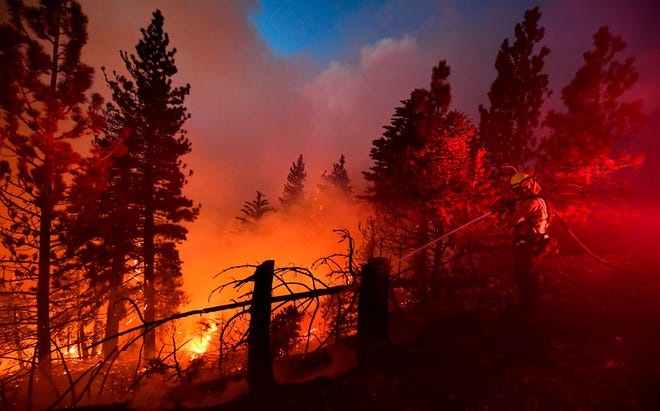The effects of the current wildfires on bees, what you can do to help
September 26, 2020
In recent years, the western United States has seen an increase in destructive wildfires. Ventura and its surrounding cities are no strangers to their devastating effects. Not only do these fires cause poor air quality and damage homes, but they also cause harm to wildlife habitats and populations, including those of bees.
Bees are a vital factor in the environment. They are pollinators, which means they help plants reproduce. Many fruits and vegetables that we eat, along with different types of nuts, beans, grains, spices and coffee are all pollinated by bees. Even cotton, which is commonly used to make clothes, could not be effectively pollinated without bees.
Distressed bee populations would yield issues not only for the food we eat and the clothes we make, but it would also greatly affect the United States economy. Honeybees alone contribute an estimated 15 billion dollars to the agricultural industry by pollinating crops. In California, the almond industry is reliant on honeybees to give their crops the means to grow successfully.
Dr. Ruben Alarcon, a biology professor at CSU Channel Islands, gave some insight into the impacts of wildfires on bees. “In the short term, [the fires are] hurting them,” he says. “They’re potentially destroying their homes, and since a lot of bees nest in trees or hollow logs and a lot of that is burning up, it’s killing a lot of bees. They’re also destroying habitat by ravaging wildflowers or whatever else is in bloom.”
Dr. Alarcon adds, “however, most of California are fire adapted ecosystems that are meant to burn. Everything should be burning every 15-30 years. After fires come through, new wildflowers emerge, so a lot of seeds actually need fires to help them germinate.”
This natural process of burning might actually be better for bees in the long term. However, in recent years, fires have been happening too frequently. “The issue is if these fires are coming more frequently and more extreme, it’s beyond what the normal fire regime should look like.” Dr. Alarcon said, “without that recovery time for new wildflowers to grow, you’re gonna lose several species of bees, and only the plant species that can survive that frequency and intensity of burning are going to survive, which will change the ecosystem.”
In the midst of our current world, it is important for us to do things that will help bees, such as growing bee-friendly plants and avoiding using pesticides. We also need to educate ourselves on the ways in which bees are crucial to the environment and our lives. In doing so, we can take the steps to ensure that bees will continue to thrive.














